Are you a foreigner pondering the idea of buying real estate in Liechtenstein? The notion might seem daunting at first, given the regulations and requirements involved. Liechtenstein, while welcoming towards foreign investments, imposes specific guidelines to maintain its controlled and regulated property market. The primary condition for purchasing real estate here as a foreign national is securing a residence permit, typically requiring at least three years of residency in the country1. It’s essential to note that owning property in Liechtenstein does not automatically grant you citizenship or a residence permit, reflecting the nation’s thoughtfully balanced investment environment.
Furthermore, the Liechtenstein property market for non-residents includes diverse property types—single-family houses, apartment blocks, and mixed-use buildings. According to a housing census conducted in 2015, the country is home to 6,283 single-family houses and 2,258 apartment blocks1. This variety ensures that foreign nationals have a range of options to choose from when investing in real estate here. Notably, even though the rental prices can be freely negotiated, there are safeguards in place to prevent disproportionate rental increases.
Key Takeaways: How to Buy a Property in Liechtenstein
- Liechtenstein welcomes foreign investments but imposes specific regulations.
- A residence permit is a crucial prerequisite for foreign nationals to buy property.
- Residency usually requires at least a three-year stay in the country1.
- Diverse property types available, including single-family houses and apartment blocks1.
- Property ownership does not equal automatic residence or citizenship rights2.
Contact us if you are Interested in Buying Property Abroad!
Overview of Liechtenstein’s Real Estate Market
Liechtenstein’s real estate market is reflective of the nation’s wealth and picturesque landscape, making it a highly sought-after location for both local and foreign investors. This alpine microstate covers merely 160 square kilometers, which restricts land availability and contributes to high property prices34. The urban areas like Vaduz and Schaan are particularly prized, highlighting the demand for real estate in these regions3
Current Market Trends
The Liechtenstein property market is characterized by a strong demand for high-quality residential and commercial properties. Non-citizens buying property in Liechtenstein encounter stringent regulations, which restrict many from entering the market without an established business presence4. The stringent Liechtenstein property ownership rules and limited geographical area further drive up property values3. Additionally, the nation’s GDP per capita is one of the highest in the world, reflecting the affluence and competitive nature of its real estate sector3/5.
Various market trends underscore the investment potential within Liechtenstein. Offices in prime locations like Vaduz are highly coveted, supported by promising growth in the commercial real estate sector3. The government offers tax incentives for investors, alongside the nation’s low corporate tax rates, making it an attractive destination for business ventures3. Moreover, developments in technology and renewable energy initiatives are set to positively impact Liechtenstein’s real estate landscape3.
Types of Properties Available
The types of properties available in Liechtenstein vary, including single-family houses, mixed-use buildings, and high-demand office spaces. Most of the available housing features owner-occupied dwellings rather than rental properties, reflecting the local preference for homeownership. Liechtenstein’s stringent land-use regulations ensure carefully planned developments and high property standards3. Despite these regulations, there are still ample opportunities for non-citizens buying property in Liechtenstein, provided they adhere to the country’s property ownership rules and secure necessary permits.
The comprehensive and meticulous land registration system guarantees transparency and security in ownership4. Likewise, legal assistance is highly advisable due to the complex framework governing real estate transactions, especially for non-residents4. This meticulousness ensures that due diligence is recommended for all property transactions to verify property status accurately4.Liechtenstein offers tax incentives, underscoring its appeal as an investment hub.
Legal Restrictions on Foreigners Buying Property
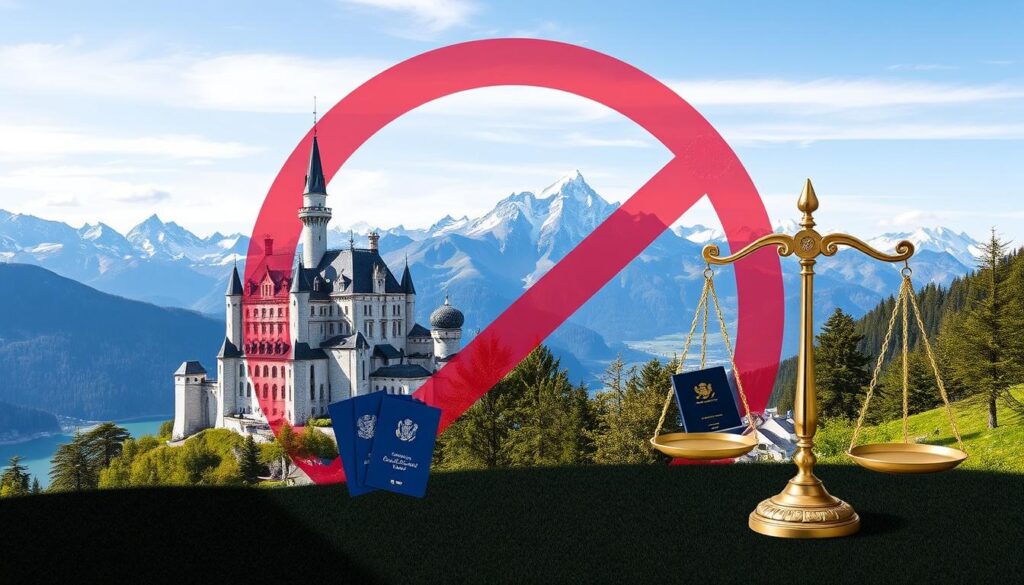
Foreign investment in Liechtenstein real estate is regulated by robust laws to ensure that the unique characteristics of the principality are preserved. With its compact size, Liechtenstein has set stringent rules to prevent an influx of foreign buyers from overwhelming the real estate market. Understanding real estate laws in Liechtenstein is crucial for anyone considering purchasing property here.
Liechtenstein Property Ownership Rules
Liechtenstein’s Civil Code governs property ownership, detailing rights and liabilities pertinent to real estate investments. The market is protected by specific laws that control ownership transfer to non-residents. These rules ensure that only individuals with a legitimate connection to the principality can own property, safeguarding the local housing availability and maintaining the cultural integrity of the area. Similar to other European territories like Denmark and Malta, local approval is essential for ownership6. Each foreign investment in Liechtenstein real estate must comply with these strict parameters, aligning with practices seen in Poland and Greece7.
Permits and Approvals Required
For foreigners, acquiring property entails more than just understanding the civil rules; obtaining the necessary permits and approvals is a prerequisite. This process includes a thorough financial assessment to ensure compliance with real estate laws in Liechtenstein. Similar to the approval processes in countries like Hungary and Austria, prospective buyers must navigate specific regulatory requirements7. These protocols are designed to prevent speculative purchases and ensure market stability. The necessity for permits and approvals applies uniformly across various types of real estate, from residential apartments to commercial spaces.
Can Foreigners Buy Real Estate in Liechtenstein?

For non-residents and non-citizens, purchasing property in Liechtenstein is typically restricted unless they plan to reside in the purchased property permanently; the same applies to certain employees who meet the required criteria8.
Eligibility Criteria for Foreign Buyers
The eligibility to buy real estate as a foreigner in Liechtenstein involves adherence to various mandates. Primarily, exceptions are made for EU/EFTA nationals employed in Liechtenstein and companies that require property for business purposes8. Furthermore, foreign buyers often need to maintain a valid work permit and demonstrate a minimum period of residence in the country8.
Steps to Purchase Property
The process of buying property in Liechtenstein as a foreigner is multifaceted. Here are the essential steps:
- Legal Consultation: Hiring a lawyer is crucial, as legal fees typically range from 1-3% of the property’s purchase price8.
- Property Valuation: A thorough property valuation is imperative to ensure accurate pricing and compliance with local laws.
- Due Diligence Checks: Conduct comprehensive due diligence checks to confirm property legitimacy and adherence to environmental regulations.
- Administrative Verifications: Ensure all administrative documents and permits are in order, which might include applications for residency or work permits for foreign buyers.
- Inspections: Property inspections are a standard part of real estate transactions in Liechtenstein, typically paid for by the buyer to avoid unexpected costs post-purchase8.
- Financing: Properties can be purchased through both cash transactions and mortgages; low interest rates for mortgages are common8.
- Finalizing Purchase: The sale-purchase agreement must be notarized to seal the deal legally.
For those considering buying property in Liechtenstein as a foreigner, understanding these steps and fulfilling the necessary criteria can greatly facilitate the process. By adhering to the legal, financial, and administrative requirements, foreign buyers can navigate the complex process seamlessly and invest wisely in Liechtenstein’s real estate market.
Getting a Residence Permit in Liechtenstein
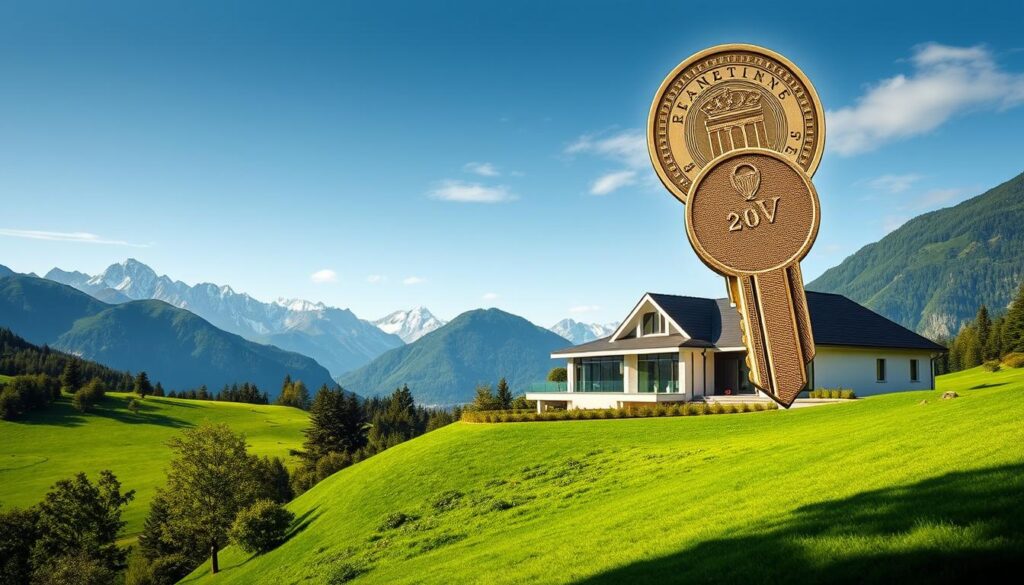
Securing a Liechtenstein residence permit can be a gateway to experiencing the country’s tranquil lifestyle and prosperous business environment. However, the small nation imposes stringent regulations on residency, meaning acquiring a permit demands meticulous preparation and understanding of various prerequisites.
Connection Between Residence Permits and Property Ownership
While acquiring property in Liechtenstein is not directly tied to obtaining a residence permit, owning real estate can bolster an applicant’s profile during the permit application process. The government annually allocates only 89 residence permits910, and competition for these is intense. Of these, 72 permits are available to EEA citizens, with half awarded through a lottery system and the rest granted based on government discretion910. Foreigners seeking a Liechtenstein residence permit or citizenship by real estate investment must still adhere to the country’s stringent criteria, including demonstrating financial stability and compliance with local regulations.
Application Process
The path to a Liechtenstein residence permit involves several steps. First, applicants must determine eligibility, especially considering that EEA citizens have a specific quota system10. Residents of the EEA are allocated 72 permits annually while Swiss citizens receive 17, with different allocations for employment and other migration purposes10. Non-EEA nationals must showcase exceptional qualifications to be considered9. Moreover, residence permit holders can reside in Liechtenstein for up to five years before applying for permanent residency9.
Once eligibility is confirmed, the next step is to submit a detailed application that includes proof of financial resources, intention of stay, and other personal documentation. Successful applicants are often provided guidance on registering with local authorities and navigating real estate transactions10. This support can be invaluable for anyone looking to leverage citizenship by real estate investment opportunities in Liechtenstein.
Gaining a Liechtenstein residence permit or citizenship by real estate investment is undoubtedly challenging given the stringent quotas and requirements. Nonetheless, understanding the intricacies of the connection between property ownership and residence permits, along with a thorough application process, can significantly enhance one’s chances of success.
Real Estate Investment Opportunities
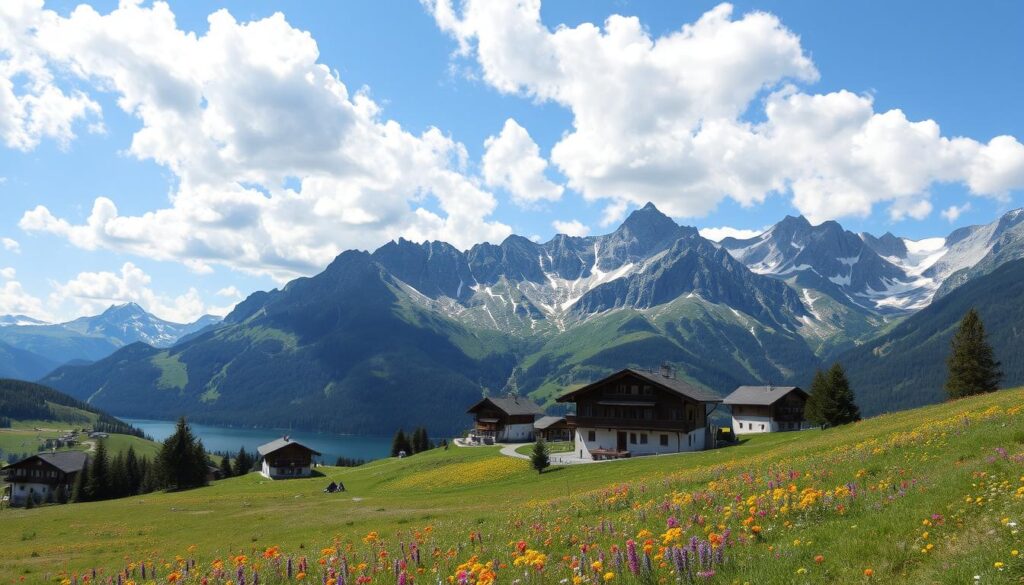
Investing in Liechtenstein real estate presents distinctive benefits due to its stable and predictable regime, low corporate tax rates, and open economy. Liechtenstein’s robust economic stability and desirability for environmental quality make it an exceptional choice for investors seeking both lifestyle and financial gains.
The country actively encourages sectors such as financial services, manufacturing, and real estate, attracting a significant number of foreign investors from EU countries and Switzerland. This focus on multiple sectors creates vast Alpine property opportunities for investors looking to tap into various profit avenues. Additionally, Liechtenstein has vowed to keep its market open for international foreign relations through agreements for automatic exchanges of financial information with the EU and Switzerland, further solidifying its investment attractiveness.
Another outstanding feature of Liechtenstein real estate investment is the diversity of properties available in the market. Whether targeting residential, commercial, or mixed-use properties, the exclusive market dynamics offer lucrative prospects for different types of investors.
Moreover, Liechtenstein maintains a favorable position in the Corruption Perception Index and Index of Economic Freedom, which adds another layer of assurance for potential investors.
Liechtenstein real estate investment opportunities harmoniously blend high financial gains with excellent environmental benefits, creating a compelling scenario for informed investment decisions11.
For investors looking to expand their portfolio with high-value assets, investing in Liechtenstein real estate can be a strategic move. For example, properties in Ljubljana, Slovenia, provide a comparative perspective for investors examining real estate across Alpine regions. In Ljubljana, the price per square meter in the city center is 4,450 €, whereas in residential areas, it is 3,399 €11. Rental rates further emphasize the potential, with prices for a one-bedroom apartment in the city center at 681 € and outside at 566 €11.
Additionally, investors should consider the tax implications in various regions to make informed decisions. For instance, the real estate transfer tax in Slovenia can be up to 2%, and the VAT rate for new buildings is 22%11. Understanding these varying financial landscapes can provide valuable insights into maximizing returns from a Liechtenstein real estate investment venture.
| Parameter | Liechtenstein | Slovenia |
|---|---|---|
| Price per sqm (City Center) | Data Not Available | 4,450 € |
| Price per sqm (Residential Areas) | Data Not Available | 3,399 € |
| Rental (1-Bedroom, City Center) | Data Not Available | 681 € |
| Rental (1-Bedroom, Outside Center) | Data Not Available | 566 € |
| Rental (3-Bedroom, City Center) | Data Not Available | 1,295 € |
| Rental (3-Bedroom, Outside Center) | Data Not Available | 1,003 € |
| Real Estate Transfer Tax | Data Not Available | Up to 2% |
| VAT on New Buildings | Data Not Available | 22% |
| Real Estate Tax | Data Not Available | 0.15% to 0.5% |
| Registration Fee | Data Not Available | Up to 0.5% |
| Income Tax on Rentals | Data Not Available | 25% |
| Capital Gains Tax | Data Not Available | 19% |
Contact us if you are Interested in Buying Property Abroad!
Legal Support and Due Diligence
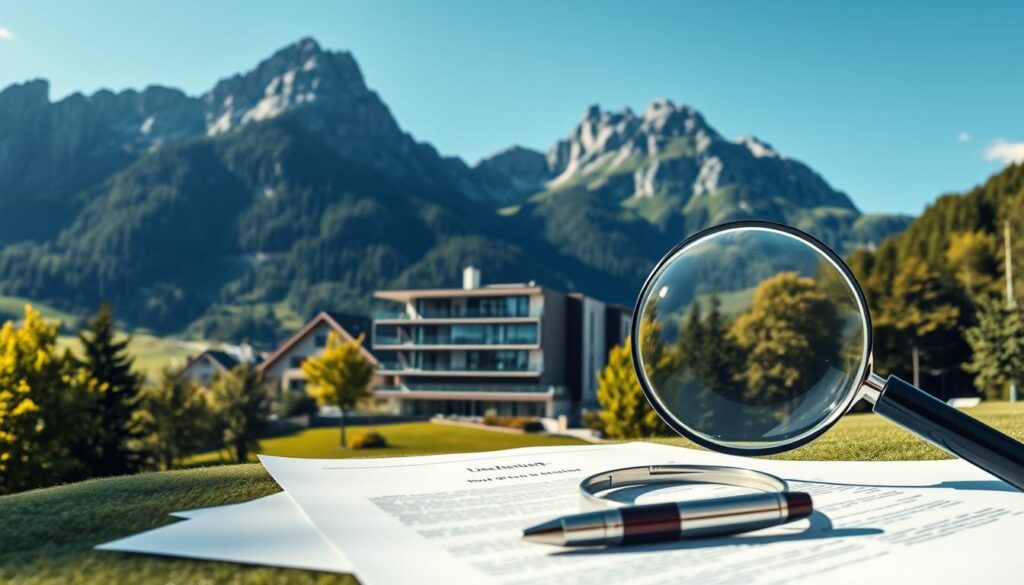
Purchasing property in Liechtenstein entails various legal intricacies that potential buyers must navigate to ensure a smooth transaction. Seeking *legal assistance in Liechtenstein real estate* reveals the significance of professional support, especially for those unfamiliar with local laws and language. Engaging experts from the get-go can prevent legal issues and facilitate thorough *due diligence in Liechtenstein property purchase*.
Working with Lawyers
Leveraging the expertise of lawyers proficient in German can significantly ease the complexities of real estate transactions. Legal professionals guide clients through property valuation against market norms, elucidate acquisition regulations, and manage thorough due diligence, which encompasses cadastral checks, compliance, and administrative veracity. Furthermore, legal advisors play a pivotal role in substantial acquisitions alongside financial or tax consultants, ensuring all regulatory and statutory parameters are met12.
Property Valuation and Inspection
Accurate property valuation and comprehensive inspection are critical components of due diligence. Engaging professionals to evaluate the property’s market value ensures a fair purchase price, while detailed inspections highlight structural integrity and compliance with local standards. This step is crucial in avoiding unforeseen expenses and legal issues in the future.
Due Diligence Checklist
An exhaustive due diligence checklist is indispensable for any property transaction. Essential items include:
- Verification of property ownership
- Assessing compliance with building codes
- Environmental regulations adherence
- Reviewing any existing liens or encumbrances
- Ensuring the accuracy of cadastral records
- Validating the legitimacy of zoning and land-use permits
This meticulous process mitigates risks, ensuring the legality and security of the investment.
Overcoming Language Barriers
Language can pose a significant barrier in legal processes, but engaging a lawyer fluent in both German and the buyer’s language can bridge this gap. Effective communication ensures that the buyer comprehensively understands all legal documents, obligations, and local regulations, facilitating a smoother transaction. This approach underscores the importance of *legal assistance in Liechtenstein real estate* to navigate potential language barriers.
For more detailed insights on commercial real estate law in Liechtenstein, consider consulting experienced legal professionals by visiting this resource.
Costs and Financing Options
Purchasing property in Liechtenstein comes with a variety of financial considerations and options, particularly for non-residents. Understanding the Liechtenstein real estate costs and mortgage solutions for non-residents in Liechtenstein is crucial for making informed decisions.
Average Property Prices
Liechtenstein’s real estate market is known for its high property prices, often reflective of its premium positioning and economic stability. Whether it’s a residential building or a commercial space, the costs can be significantly higher compared to other European countries. Buyers should be prepared to invest a considerable amount in both the purchase price and the additional associated costs.
Mortgage Options for Foreigners
The diverse mortgage solutions for non-residents in Liechtenstein offer flexibility and tailored financial plans. These include:
- Fixed-rate mortgages: Interest payments are made every half-year for the entire term of the mortgage13.
- Money Market mortgages: The interest rate is based on SARON and can be adjusted monthly or quarterly, with contract terms available for two to five years13.
- Money Market Flex mortgages: These also use the SARON rate but have a term of one or three months, renewable automatically13.
- Variable basic mortgages: The minimum amount is CHF 20,000, with a contract period of six months and interest rates adjusted half-yearly13.
- Environmental mortgages: Suitable for energy-efficient investments, these five-year term mortgages offer preferential conditions for new constructions and renovations13.
For fixed-rate mortgages, the minimum amount required is CHF 100,000, and they are only possible as a first mortgage14. Options like forward fixed-rate mortgages allow interest rates to be fixed up to three years in advance14. Various mortgage models are available for financing projects, catering specifically to the need for flexible adjustment according to individual requirements.
To explore more detailed options for financing your residential project in Liechtenstein, visit this link.
Associated Costs and Fees
In addition to Liechtenstein real estate costs, prospective buyers should anticipate various other fees. Typical associated costs include legal fees, notary fees, and a variety of administrative charges necessary for property transactions. Additionally, buyers must consider the notional income tax applicable on the property’s net value, although there is no explicit real property tax in Liechtenstein.
- Minimum percentage of lending value required as borrower’s own capital: at least 20%14
- Net income prerequisite for a mortgage: 30,000 CHF14
- Construction loan interest rate: variable, plus a credit commission14
Using Real Estate Agents
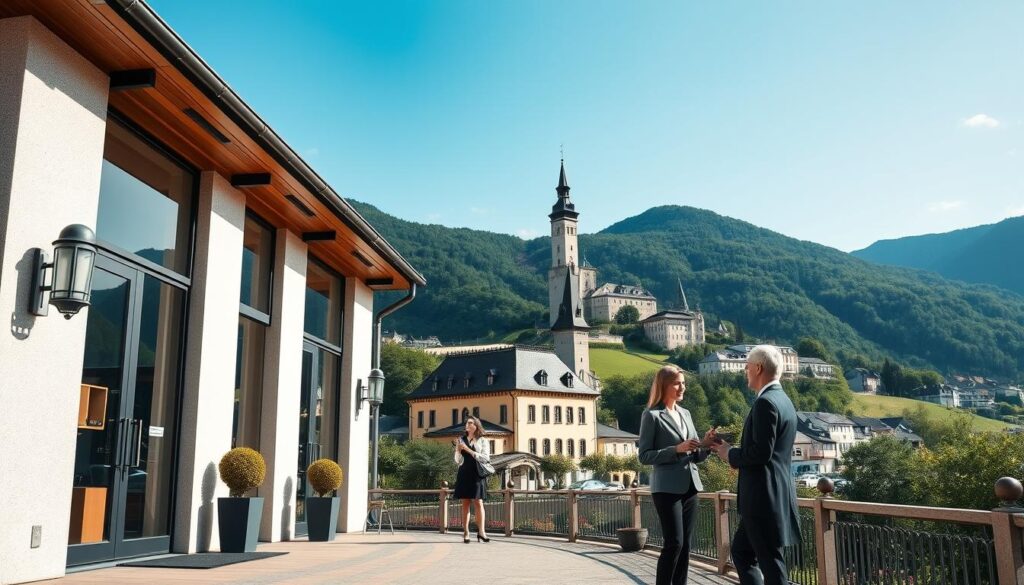
Engaging with real estate agents in Liechtenstein can significantly streamline the property acquisition process. These professionals are adept at curating properties that match specific criteria, making the Liechtenstein property hunt more efficient. Furthermore, agents play a critical role in ensuring that all legal aspects are properly managed. They coordinate with the Land Register to guarantee that the transaction is legally sound, providing invaluable peace of mind to buyers.
- Agents possess in-depth local market knowledge.
- They offer bespoke property listings tailored to the buyer’s needs.
- Real estate agents help in negotiating terms and pricing effectively.
- They facilitate the coordination of legal requirements, working in harmony with Notaries and the Land Register.
The process of working with real estate agents in Liechtenstein can be particularly advantageous for foreigners, given the unique market regulations and restrictions. For example, Liechtenstein allows each year only 28 EU nationals to become owners of Liechtenstein properties, and that too only after a minimum of three years of residency1. In addition, the due diligence process in Liechtenstein is intricate, involving objectives identification, information gathering, risk assessment, and cost clarification1. Real estate agents facilitate these steps, ensuring a smooth transaction.
Furthermore, the financial aspects related to buying property can be complicated, especially for those needing mortgages. The requirements for obtaining a mortgage in Liechtenstein for foreign buyers are similar to those for Swiss citizens, necessitating conditions based on the type of residence permit held, such as minimum income and proof of employment [source]15. Real estate agents often have established relationships with local financial institutions, helping to facilitate the mortgage approval process.
In conclusion, when deciding to buy property in Liechtenstein, partnering with a knowledgeable real estate agent can be immensely beneficial. They not only offer valuable market insight and property recommendations but also ensure compliance with local laws and regulations, making the overall Liechtenstein property hunt more seamless.
Common Pitfalls and How to Avoid Them
When it comes to avoiding real estate mistakes in Liechtenstein, being aware of common pitfalls can save you from costly errors. Safe property purchase strategies revolve around thorough research, professional guidance, and understanding the local market intricacies.
Legal and Administrative Issues
One significant pitfall is navigating the complex legal and administrative frameworks governing property purchases. The Treaty between the Principality of Liechtenstein and the Swiss Confederation on the recognition and enforcement of judgments and arbitral awards dated 25 April 1968 applies to Liechtenstein and Switzerland16. Similarly, the Treaty with Austria on the same matters dated 5 July 1973 applies to Liechtenstein and Austria16. Ensuring compliance with these treaties is crucial for safe property purchase strategies.
Market Risks
The real estate market in Liechtenstein is unique and subject to its own risks. For instance, unforeseen financial commitments and valuation misjudgments can impact investment returns. Being aware of the European Convention of 20 May 1980, which concerns the recognition and enforcement of decisions relating to custody rights for children, is essential because it applies to numerous countries including Liechtenstein and influences the local legal context16. One way to mitigate these market risks is to engage in comprehensive due diligence through professional valuations and inspections.
Negotiation Tips
Skillful negotiation is pivotal when buying property in Liechtenstein. Understanding that legal customs align with international standards, such as those outlined in the New York Convention on the Recognition and Enforcement of Foreign Arbitral Awards 195816, can give you leverage. Seeking expert advice can help you devise safe property purchase strategies that effectively navigate these legal landscapes. Moreover, favoring arbitration over litigation can provide a quicker, less costly resolution to disputes.
For further details on buying real estate in Liechtenstein and other countries, visit this comprehensive resource here.
Conclusion
Successful property acquisition in Liechtenstein requires thoughtful navigation through its complex legal landscape. While foreigners indeed face restrictions in acquiring domestic real estate, these challenges are not insurmountable. By understanding the specific approvals needed and working closely with legal professionals, buyers can seamlessly comply with the local frameworks and limitations17.
Final thoughts on Liechtenstein real estate must consider both the benefits and the thorough due diligence needed. For instance, Liechtenstein’s progressive income and property taxation rates affect both residents and non-residents based on their assets and earnings18. This reinforces the importance of aligning property investments with individual tax obligations to ensure optimized financial planning.
In conclusion, Liechtenstein presents a prestigious and rewarding opportunity for real estate investment, provided buyers engage in meticulous research and adhere to regulatory compliance. With the right guidance, acquiring property in this tranquil alpine nation can specifically yield excellent returns and an enviable lifestyle. Given these insights, pursuing such an investment in Liechtenstein holds significant promise for foreign investors who are well-prepared and informed.
Contact us if you are Interested in Buying Property Abroad!
FAQ
Can foreigners buy real estate in Liechtenstein?
Yes, foreigners can buy real estate in Liechtenstein, but they must secure a residence permit as a precondition. The process is regulated to manage the limited market and protect Liechtenstein’s compact size.
What types of properties are available in Liechtenstein?
The property market in Liechtenstein offers various types of properties, including single-family houses and mixed-use buildings. There is a prevalent trend of owner-occupied dwellings versus rental properties.
What are the current market trends for real estate in Liechtenstein?
The real estate market in Liechtenstein is geared towards EU nationals with a limited number of properties available annually. The picturesque setting and strong economic stability make it an attractive investment.
What are the legal restrictions on foreigners buying property in Liechtenstein?
Foreigners face stringent restrictions and must adhere to specific legal requirements, including obtaining a residence permit contingent on a financial assessment. The Civil Code governs property ownership rights and liabilities.
What are Liechtenstein’s property ownership rules?
Property ownership rules in Liechtenstein are governed by the Civil Code. Foreigners must meet eligibility criteria, such as a minimum residential tenure and a valid work permit for certain employees, and achieve compliance with local laws and regulations.
What permits and approvals are required for foreign property buyers in Liechtenstein?
Foreign investors need to secure a residence permit, undergo property valuation, complete due diligence checks, and adhere to environmental laws. The final step includes signing a notarized sale-purchase agreement.
What is the connection between residence permits and property ownership in Liechtenstein?
In Liechtenstein, owning property is not directly linked to obtaining a residence permit or citizenship. However, non-residents must navigate an application process that scrutinizes their financial standing and meets other government-established criteria.
What steps should foreign buyers follow to purchase property in Liechtenstein?
Foreign buyers should start with securing a residence permit, followed by property valuation, due diligence, administrative verifications, and adhering to environmental regulations. The process ends with a notarized sale-purchase agreement.
What are the financing options available for purchasing real estate in Liechtenstein?
Financing options in Liechtenstein range from traditional fixed mortgages to variable plans like LIBOR loans. Prospective buyers should also consider notional income tax on the property’s net value, though no explicit real property tax exists.
What are the average property prices in Liechtenstein?
Property prices in Liechtenstein are generally high, reflecting its desirability and exclusivity. The average cost varies depending on the type, location, and size of the property.
How can real estate agents assist in purchasing property in Liechtenstein?
Real estate agents help in navigating the market, curating properties that match preferences, and ensuring legal soundness by coordinating with the Land Register. They are integral to a smooth and legally compliant purchase process.
What are the common pitfalls when buying real estate in Liechtenstein, and how can they be avoided?
Common pitfalls include legal and administrative issues, misjudgments in property valuation, and unseen financial commitments. These can be mitigated by expert negotiation, comprehensive due diligence, and legal assistance.
What role do lawyers play in the property purchase process in Liechtenstein?
Lawyers fluent in German offer vital assistance with property valuation, legal clarity on acquisition regulations, due diligence, administrative veracity, and ensuring compliance with environmental laws to mitigate any potential risks.
What is the due diligence process for buying property in Liechtenstein?
Due diligence includes property valuation, cadastral checks, structural standards compliance, administrative veracity, and adherence to environmental laws. This thorough process helps in mitigating potential risks.
Source Links
- https://lawyersliechtenstein.com/purchase-a-property-in-liechtenstein/
- https://www.expatexchange.com/gd/9/71/Liechtenstein/Real-Estate-in-Liechtenstein
- https://mgz.com.tw/2024/08/10/liechtensteins-real-estate-market-opportunities-for-investors/
- https://mgz.com.tw/2024/07/31/real-estate-law-in-liechtenstein-buying-and-selling-property/
- https://www.state.gov/reports/2022-investment-climate-statements/switzerland-and-liechtenstein/
- https://wise.com/us/blog/buying-property-in-europe
- https://realting.com/news/where-it-is-banned-or-hard-for-foreigners-to-buy-real-estate
- https://www.expatexchange.com/ctryguide/18855/71/Liechtenstein/How-to-Buy-a-Home-in-Liechtenstein
- https://lawyersliechtenstein.com/obtain-residence-permit-in-liechtenstein/
- https://visitworld.today/blog/868/ways-to-move-to-the-kingdom-of-liechtenstein-obtaining-a-residence-permit-and-permanent-residence
- https://www.mercuryestate.com/en/luxury-real-estate-news/faq-about-buying-and-renting-real-estate-in-slovenia.html
- https://iclg.com/practice-areas/mergers-and-acquisitions-laws-and-regulations/liechtenstein
- https://llb.li/en/business/financing/mortgages/mortgage-models
- https://www.vpbank.com/en-li/private-clients/financing/real-estate-financing
- https://www.credit-suisse.com/articles/private-banking/2022/06/en/als-auslaender-immobilien-kaufen-wissenswertes-rund-um-den-hauskauf.html
- https://iclg.com/practice-areas/enforcement-of-foreign-judgments-laws-and-regulations/liechtenstein
- https://www.lexmundi.com/guides/lex-mundi-global-foreign-investment-restrictions-guide/jurisdictions/europe/liechtenstein/
- https://iclg.com/practice-areas/private-client-laws-and-regulations/liechtenstein

Comments